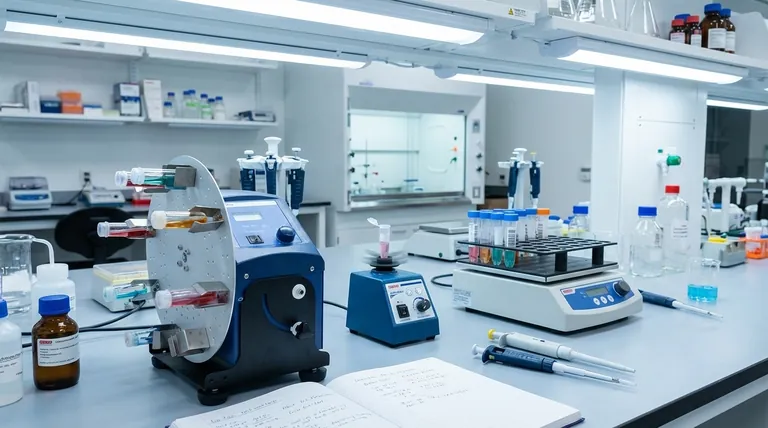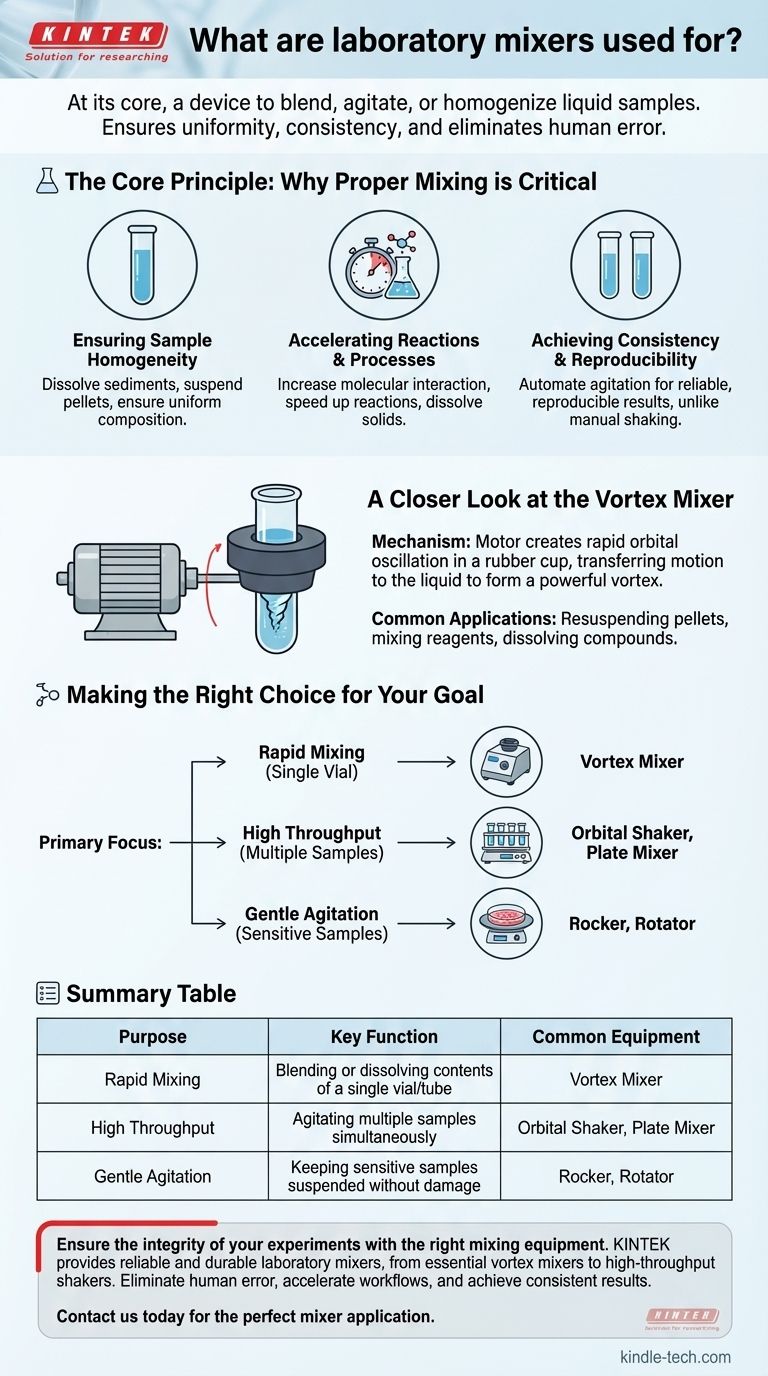At its core, a laboratory mixer is a device used to blend, agitate, or homogenize liquid samples. The most common type, a vortex mixer, uses a motor to rapidly oscillate a small rubber cup. When a test tube or vial is pressed into this cup, the motion creates a vortex within the liquid, ensuring its contents are thoroughly mixed in seconds.
The fundamental purpose of a laboratory mixer is to guarantee sample uniformity and consistency. This eliminates a major source of human error, ensuring that experimental results are reliable and reproducible.

The Core Principle: Why Proper Mixing is Critical
In any scientific setting, the integrity of your sample is paramount. Inconsistent or incomplete mixing can invalidate an entire experiment. Mixers solve this by automating a critical and otherwise variable step.
Ensuring Sample Homogeneity
Many laboratory samples are not uniform solutions. They often contain sediments, cell pellets, or reagents that need to be fully dissolved or suspended before use. A mixer ensures every drop of the liquid has the same composition.
Accelerating Reactions and Processes
Mixing dramatically increases the interaction between molecules in a sample. This is essential for speeding up chemical reactions, dissolving solids into a solvent, or resuspending biological materials for analysis.
Achieving Consistency and Reproducibility
Manually shaking a tube is inconsistent. The force, duration, and angle of agitation will vary every time and between different lab members. A mixer applies the exact same motion for the same amount of time, providing a level of reproducibility that is essential for valid scientific comparison.
A Closer Look at the Vortex Mixer
The vortex mixer is the quintessential lab workhorse. Its simplicity and effectiveness make it one of the most common pieces of equipment on any lab bench.
The Mechanism of Action
An electric motor is connected to a small rubber cup in an offset manner. When the motor spins, this offset connection translates the rotational energy into a rapid orbital oscillation. This motion is transferred to the liquid in the vessel, creating a powerful vortex.
Common Applications
The vortex mixer is used for countless routine tasks. This includes resuspending bacterial or DNA pellets, mixing reagents for an assay, or dissolving drug compounds in a solvent.
Understanding the Trade-offs and Variations
While the vortex mixer is common, not all mixing needs are the same. The choice of equipment involves balancing durability, scale, and the specific requirements of the sample.
Durability vs. Delicacy
A simple vortex mixer is a true lab workhorse, designed for frequent use and easy sterilization. More complex or delicate equipment may be required for specific tasks, but these often require more significant maintenance and careful cleanup between uses to avoid cross-contamination.
Scale and Application
The standard mixer handles one small vial at a time. For higher throughput, labs use shakers that can accommodate entire racks of tubes or microplates. For very large volumes, industrial-scale floor-standing machines may be used, though these are less common in a typical research lab.
Making the Right Choice for Your Goal
Selecting the correct mixing method is crucial for protecting your sample and achieving your experimental goal.
- If your primary focus is rapid mixing of individual vials: The standard vortex mixer is the indispensable tool for this task.
- If your primary focus is preparing multiple samples at once: An orbital shaker or plate mixer that can hold racks of tubes or plates is the more efficient choice.
- If your primary focus is gentle and continuous agitation: For sensitive samples like cell cultures, a gentle rocker or rotator is required to keep them suspended without causing damage.
Ultimately, using the right laboratory mixer is a foundational step in generating trustworthy and accurate data.
Summary Table:
| Purpose | Key Function | Common Equipment |
|---|---|---|
| Rapid Mixing | Blending or dissolving contents of a single vial/tube. | Vortex Mixer |
| High Throughput | Agitating multiple samples simultaneously. | Orbital Shaker, Plate Mixer |
| Gentle Agitation | Keeping sensitive samples (e.g., cell cultures) suspended without damage. | Rocker, Rotator |
Ensure the integrity of your experiments with the right mixing equipment.
KINTEK specializes in providing reliable and durable laboratory mixers, from essential vortex mixers to high-throughput shakers, designed to meet the rigorous demands of modern labs. Our equipment helps you eliminate human error, accelerate workflows, and achieve consistent, reproducible results every time.
Contact us today to find the perfect mixer for your specific application and enhance your lab's efficiency. Get in touch with our experts now!
Visual Guide

Related Products
- Laboratory Disc Rotary Mixer for Efficient Sample Mixing and Homogenization
- Laboratory Test Sieves and Sieving Machines
- Laboratory Single Horizontal Jar Mill
- Laboratory Vibratory Sieve Shaker Machine Slap Vibrating Sieve
- Laboratory Ten-Body Horizontal Jar Mill for Lab Use
People Also Ask
- What is the core function of a high-energy ball mill in the preparation of Al-Cu-ZrC composite powders? | KINTEK
- What is the use of grinding in laboratory? Unlock Accurate & Homogeneous Sample Analysis
- What is the function of mechanical grinding equipment in lignocellulosic pretreatment? Maximize Yeast Biodiesel Yields
- What is the purpose of grinding bulk solid catalysts into fine powder? Maximize Surface Area and Catalytic Efficiency
- How does the particle classification process differ between circular jet mills and fluid bed jet mills?
- What is the impact of speed on ball mill performance? Optimize Grinding Efficiency & Particle Size
- What is the purpose of performing secondary grinding with a ball mill on annealed LAGP glass? Boost Sintering Results
- What is the primary role of a high-energy ball mill in remediation nanoparticles? Transform Bulk to Nano Reactivity



















